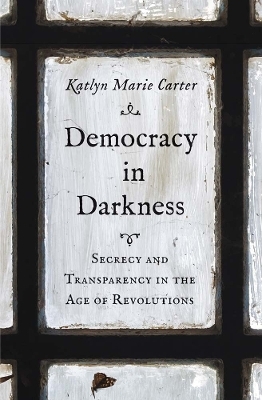
Democracy in Darkness
Secrecy and Transparency in the Age of Revolutions
Seiten
2024
Yale University Press (Verlag)
978-0-300-24692-6 (ISBN)
Yale University Press (Verlag)
978-0-300-24692-6 (ISBN)
How debates over secrecy and transparency in politics during the eighteenth century shaped modern democracy
“Thought-provoking. . . . As Carter’s history shows with wonderful nuance, democratic governance is about a process of ongoing negotiation, not merely being in the know.”—Bronwen Everill, Foreign Policy
Does democracy die in darkness, as the saying suggests? This book reveals that modern democracy was born in secrecy, despite the widespread conviction that transparency was its very essence.
In the years preceding the American and French revolutions, state secrecy came to be seen as despotic—an instrument of monarchy. But as revolutionaries sought to fashion representative government, they faced a dilemma. In a context where gaining public trust seemed to demand transparency, was secrecy ever legitimate? Whether in Philadelphia or Paris, establishing popular sovereignty required navigating between an ideological imperative to eradicate secrets from the state and a practical need to limit transparency in government. The fight over this—dividing revolutionaries and vexing founders—would determine the nature of the world’s first representative democracies.
Unveiling modern democracy’s surprisingly shadowy origins, Carter reshapes our understanding of how government by and for the people emerged during the Age of Revolutions.
“Thought-provoking. . . . As Carter’s history shows with wonderful nuance, democratic governance is about a process of ongoing negotiation, not merely being in the know.”—Bronwen Everill, Foreign Policy
Does democracy die in darkness, as the saying suggests? This book reveals that modern democracy was born in secrecy, despite the widespread conviction that transparency was its very essence.
In the years preceding the American and French revolutions, state secrecy came to be seen as despotic—an instrument of monarchy. But as revolutionaries sought to fashion representative government, they faced a dilemma. In a context where gaining public trust seemed to demand transparency, was secrecy ever legitimate? Whether in Philadelphia or Paris, establishing popular sovereignty required navigating between an ideological imperative to eradicate secrets from the state and a practical need to limit transparency in government. The fight over this—dividing revolutionaries and vexing founders—would determine the nature of the world’s first representative democracies.
Unveiling modern democracy’s surprisingly shadowy origins, Carter reshapes our understanding of how government by and for the people emerged during the Age of Revolutions.
Katlyn Marie Carter is assistant professor of history at the University of Notre Dame. She lives in South Bend, IN.
| Erscheinungsdatum | 19.12.2023 |
|---|---|
| Reihe/Serie | The Lewis Walpole Series in Eighteenth-Century Culture and History |
| Zusatzinfo | 9 b-w illus. |
| Sprache | englisch |
| Maße | 156 x 235 mm |
| Themenwelt | Geschichte ► Allgemeine Geschichte ► Neuzeit (bis 1918) |
| Sozialwissenschaften ► Politik / Verwaltung ► Politische Systeme | |
| ISBN-10 | 0-300-24692-7 / 0300246927 |
| ISBN-13 | 978-0-300-24692-6 / 9780300246926 |
| Zustand | Neuware |
| Haben Sie eine Frage zum Produkt? |
Mehr entdecken
aus dem Bereich
aus dem Bereich
Europa 1848/49 und der Kampf für eine neue Welt
Buch | Hardcover (2023)
DVA (Verlag)
CHF 67,20
Giordano Bruno - ein ketzerisches Leben
Buch | Hardcover (2024)
C.H.Beck (Verlag)
CHF 41,85


